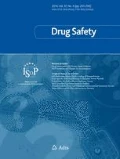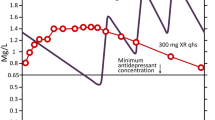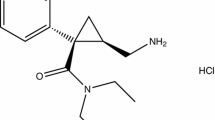Summary
Moclobemide, a novel benzamide, is a reversible inhibitor of monoamine oxidase-A (RIMA). It has been extensively evaluated in the treatment of a wide spectrum of depressive disorders. Comparative studies have shown that the drug is more effective than placebo and as effective as other antidepressants. In terms of efficacy, moclobemide offers no more benefits than do existing agents. On the other hand, moclobemide is better tolerated than tricyclic antidepressants and, unlike irreversible monoamine oxidase inhibitors, has a much lower propensity to cause a ‘cheese reaction’ (a potentially fatal syndrome caused by an interaction with tyramine-rich foods). These are significant clinical benefits, particularly in elderly patients. Furthermore, moclobemide lacks significant effects on psychomotor performance and cognitive function, has few clinically important drug interactions and is safe on overdose. The drug has a relatively short plasma elimination half-life, a property that allows a change to an alternative agent within 24 hours in cases of nonresponse. Since it is well tolerated, therapeutic dosages can often be achieved from the onset of treatment.
These benefits need to be considered against the potential risks of moclobemide therapy. To date, the most significant hazards of therapy appear to arise from drug interactions with clomipramine or selective serotonin (5-hydroxytryptamine; 5-HT) reuptake inhibitors, where the occurrence of the serotonin syndrome is potentially fatal. Similarly, in preclinical tests moclobemide has been shown to potentiate the effects of pethidine (meperidine) and dextropropoxyphene, so that combined use of moclobemide with opioids should be avoided.
Moclobemide is a useful addition to the therapeutic agents used for depressive disorders. The benefits of the drug outweigh the risks in this condition. Careful clinical evaluation is required to fully assess the benefits of the drug in other indications, such as panic disorder and social phobias.
Similar content being viewed by others
References
Crane GE. Iproniazid (marsilid) phosphate, a therapeutic agent for mental disorders and debilitating disease. Psychiatr Res Rep 1957; 8: 142–52
British Medical Research Council. Clinical trials of the treatment of depressive illness. BMJ 1965; 1: 881–6
Kwan SW, Bergeron JM, Abell CW. Molecular properties of monoamine oxidases A and B. Psychopharmacology 1992; 106: S1–5
Fowler CJ, Ross SB. Selective inhibitors of monoamine oxidase A and B: biochemical, pharmacological and clinical properties. Med Res Rev 1984; 4: 323–58
Strolin-Benedetti M, Dostert P. Overview of the present state of MAO inhibitors. J Neural Transm 1987; 23 Suppl.: 103–19
Green AR, Youdim MBH. Effect of monoamine oxidase inhibition by clorgyline, deprenyl or tranylcypromine on 5HT concentration in rat brain and hyperactivity following tryptophan administration. Br J Pharmacol 1975; 55: 415–22
Haefely W, Burkard WP, Cesura AM, et al. Biochemistry and pharmacology of moclobemide, a prototype RIMA. Psycho-pharmacology 1992; 106: S6–14
Da Prada M, Kettler R, Keller HH, et al. Preclinical profiles of the novel reversible MAO-A inhibitors, moclobemide and brofaromine, in comparison with irreversible MAO inhibitors. J Neural Transm 1989; 28 Suppl.: 5–20
Cesura AM, Kettler R, Imhof R, et al. Mode of action and characteristics of monoamine oxidase-A inhibition by moclobemide. Psychopharmacology 1992; 106: S15–6
Schoerlin M-P, DaPrada M. Species-specific biotransformation of moclobemide: a comparative study in rats and humans. Acta Psychiatr Scand 1990; Suppl. 360: 108–10
Da Prada M, Kettler R, Keller HH, et al. Neurochemical profile of moclobemide, a short-acting and reversible inhibitor of monoamine oxidase type A. J Pharmacol Exp Ther 1989; 248: 400–14
Priest RG. Moclobemide: a range of opportunities. Psychopharmacology 1992; 106: S140–1
Trott GE, Friese HJ, Menzel M, et al. Use of moclobemide in children with attention deficit hyperactivity disorder. Psychopharmacology 1992; 106: S134–6
Tiller JWG. Clinical overview on moclobemide. Prog Neuropsych Biol Psychiatry 1993; 17: 703–12
Stabl M, Biziere K, Schmid-Burgk W, et al. Review of comparative clinical trials. Moclobemide vs. tricyclic antidepressants and vs. placebo in depressive states. J Neural Transm 1989; 28 Suppl.: 77–89
Woggon B. The role of moclobemide in endogenous depression: a survey of recent data. Int Clin Psychopharmacol 1993; 7: 137–9
Silverstone T. Moclobemide — placebo controlled trials. Int Clin Psychopharmacol 1993; 7: 133–6
Ose E, Holm P. Moclobemide and placebo in mild major depression: a double-blind randomized trial. Psychopharmacology 1992; 106: S114–5
Casacchia M, Carolei A, Barba C, et al. A placebo-controlled study of the antidepressant activity of moclobemide, a new MAO-A inhibitor. Pharmacopsychiatry 1984; 17: 122–5
Botte L, Gilles C, Evrard JL, et al. Moclobemide versus placebo in the treatment of depression: a multicentre study in Belgium. Acta Psychiatr Scand 1990; 360 Suppl.: 42
Versiani M, Oggero U, Alterwain P, et al. A double-blind comparative trial of moclobemide vs. Imipramine and placebo in major depressive episodes. Br J Psychiatry 1989; 155 Suppl. 6: 72–7
Larsen JK, Holm P, Hoyer E, et al. Moclobemide and clomipramine in reactive depression: a placebo controlled randomized clinical trial. Acta Psychiatr Scand 1989; 79: 530–6
Bakish D, Bradwejn J, Nair N, et al. A comparison of moclobemide, amitriptyline and placebo in depression: a Canadian multicentre study. Psychopharmacology 1992; 106: S98–101
Angst J, Stabl M. Efficacy of moclobemide in different patient groups: a meta-analysis of studies. Psychopharmacology 1992; 106: S109–3
American Psychiatric Association. Diagnostic and statistical manual of mental disorder. 3rd ed., rev. Washington DC: American Psychiatric Association, 1987
Moll E, Stabl M, Wegscheider R, et al. Long-term treatment with moclobemide. An open-label, non-comparative, multi-distrbuted study in patients with a major depressive episode as defined by DSM-III. Psychopharmacology 1992; 106: S120–2
Amrein R, Hetzel W, Stabl M, et al. RIMA-A new concept in the treatment of depression with moclobemide. Int Clin Psychopharmacol 1993; 7: 123–32
Blackwell B, Marley E, Price J, et al. Hypertensive interactions between monoamine oxidase inhibitors and foodstuffs. Br J Psychiatry 1967; 113: 349–65
Burn JH, Rand MJ. The action of sympathomimetic amines in animals treated with reserpine. J Physiol (Lond) 1958; 336: 314–36
Korn A, Da Prada M, Raffesberg W, et al. Tyramine pressor effect in man: studies with moclobemide, a novel, reversible monoamine oxidase inhibitor. J Neural Transm 1988; 26 Suppl.: 57–71
Da Prada M, Zurcher G, Wuthrich I, et al. On tyramine, food, beverages and the reversible MAO inhibitor moclobemide. J Neural Transm 1988; 26 Suppl.: 31–56
Da Prada M, Zurcher G. Tyramine content of preserved and fermented foods or condiments of Far Eastern cuisine. Psychopharmacology 1992; 106: S32–4
Dingemanse J. An update of recent moclobemide interaction data. Int Clin Psychopharmacol 1993; 7: 167–80
Amrein R, Guntert TW, Dingemanse J, et al. Interactions of moclobemide with concomitantly administered medication: evidence from pharmacological and clinical studies. Psychopharmacology 1992; 106: S24–31
Spigset D, Mjorndal T, Lovheim O. Serotonin syndrome caused by a moclobemide-clomipramine interaction [letter]. BMJ 1993; 306: 248
Neuvonen PJ, Pohjola-Sintonen S, Tacke U, et al. Five fatal cases of serotonin syndrome after moclobemide-citalopram or moclobemide-clomipramine overdoses [letter]. Lancet 1993; 342: 1419
Schoerlin MP, Mayersohn M, Hoevels B, et al. Cimetidine alters the disposition kinetics of the monoamine oxidase-A inhibitor moclobemide. Clin Pharmacol Ther 1991; 49: 32–8
Cassidy S, Henry J. Fatal toxicity of antidepressant drugs in overdosage. BMJ 1987; 295: 1021–4
Hetzel W. Safety of moclobemide taken in overdose for attempted suicide. Psychopharmacology 1992; 106: S127–9
Hindmarch I, Kerr J. Behavioral toxicity of antidepressants with particular reference to moclobemide. Psychopharmacology 1992; 106: S49–55
Author information
Authors and Affiliations
Rights and permissions
About this article
Cite this article
Norman, T.R., Burrows, G.D. A Risk-Benefit Assessment of Moclobemide in the Treatment of Depressive Disorders. Drug-Safety 12, 46–54 (1995). https://doi.org/10.2165/00002018-199512010-00004
Published:
Issue Date:
DOI: https://doi.org/10.2165/00002018-199512010-00004




